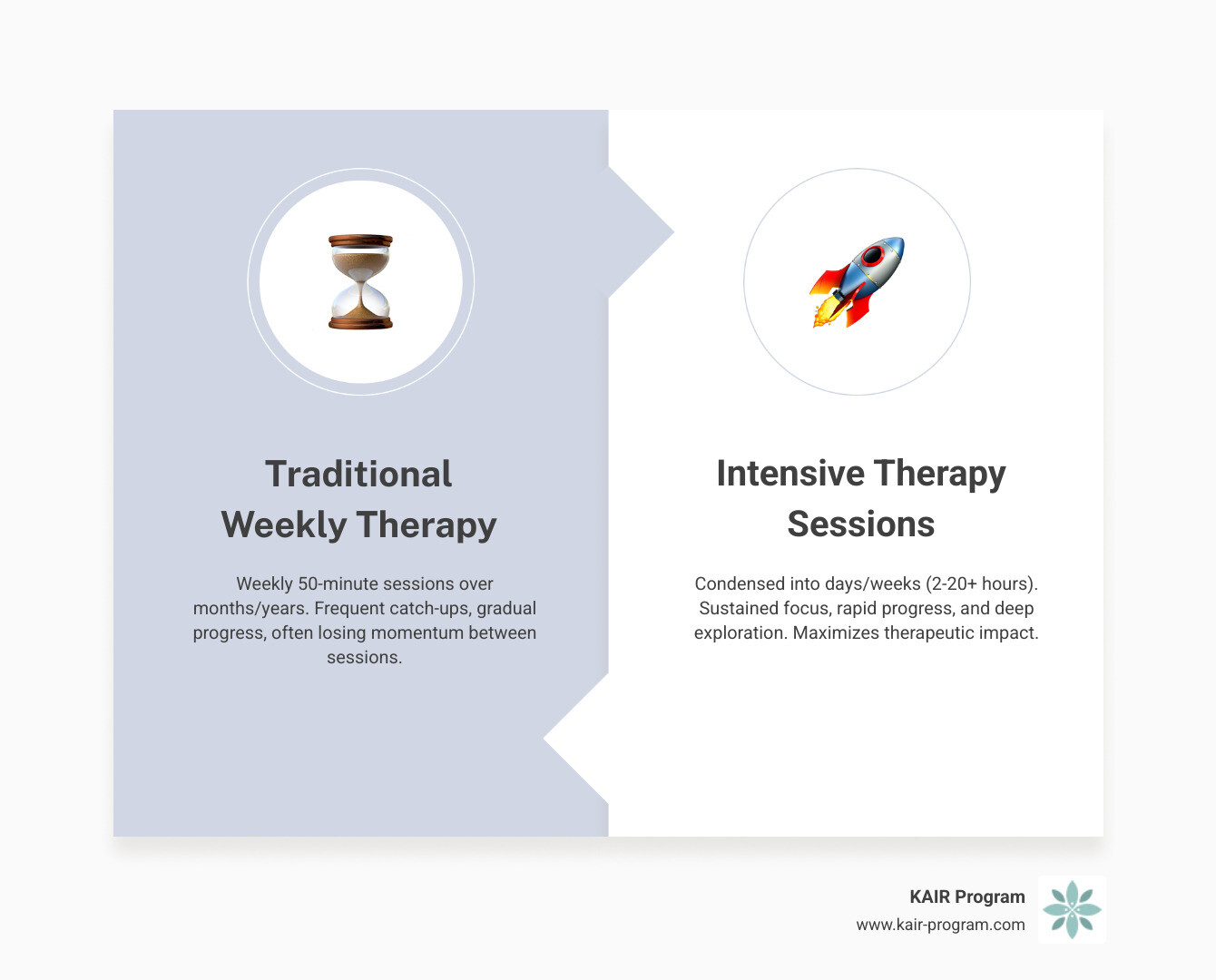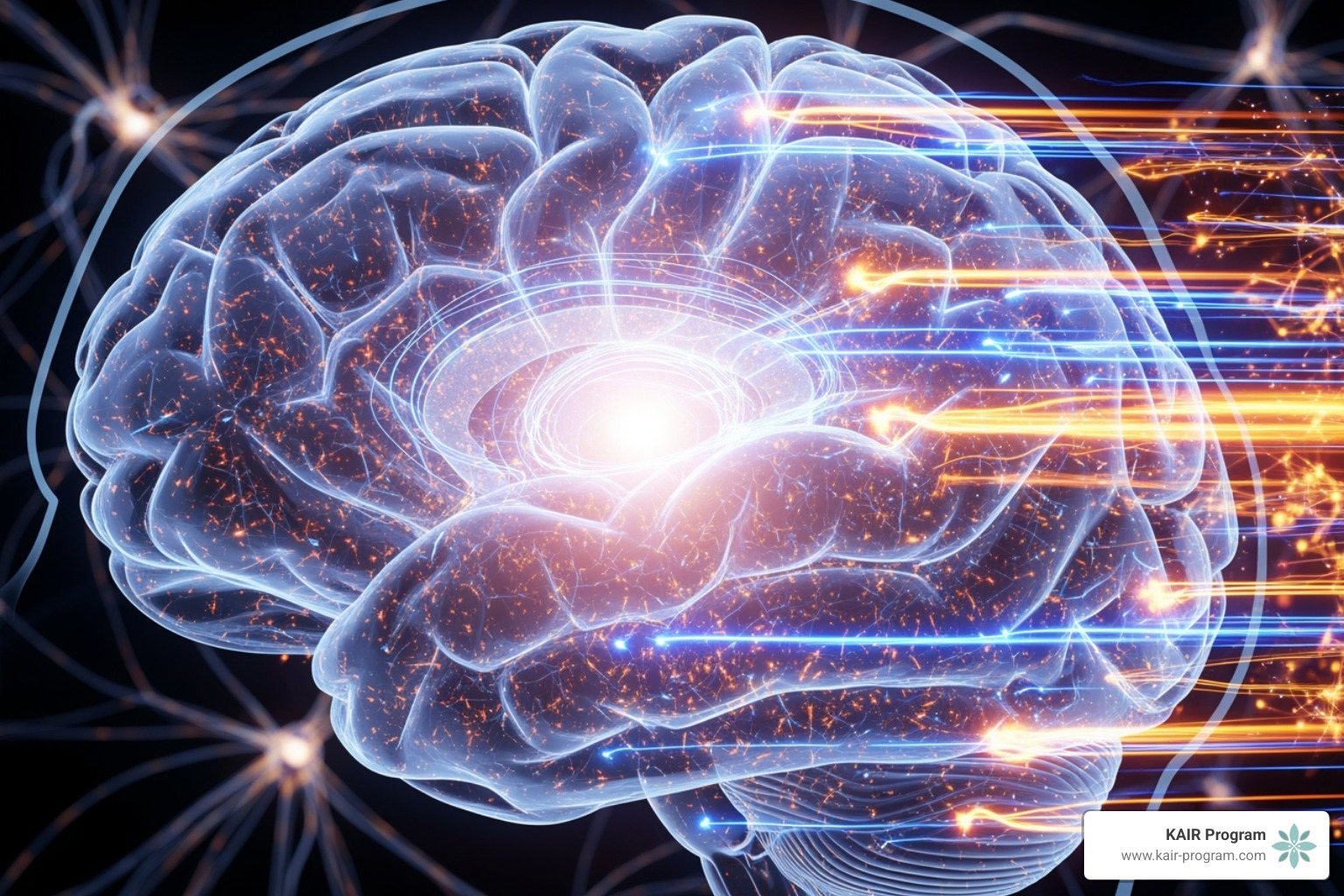Intensive Therapy 101: Everything You Need to Know
Why Intensive Therapy Sessions Are Revolutionizing Mental Health Treatment

Intensive therapy sessions are changing how we approach mental health by condensing months of traditional therapy into focused periods of treatment. Instead of weekly 50-minute sessions, this model uses concentrated blocks of time to achieve profound results in just a few days.
Key Features of Intensive Therapy Sessions:
- Duration: 2-20 hours of therapy over 2-14 days
- Format: Multiple hours per day in concentrated blocks
- Focus: Deep, uninterrupted therapeutic work
- Results: Faster symptom relief and breakthroughs
- Cost: Often more cost-effective than months of traditional therapy ($2,400-$8,000 total)
Research shows that a therapy intensive can be as effective as, or even better than, traditional therapy for conditions like PTSD, anxiety, and depression. For example, one study on intensive Cognitive Therapy for PTSD found that 85.7% of patients no longer met PTSD criteria post-treatment, with faster improvement and no dropouts.
The key is therapeutic momentum. Traditional weekly therapy often involves spending the first part of a session catching up, leaving only a short window for deep work before time is up. Intensive sessions eliminate this start-and-stop cycle. By dedicating several hours over a few days, you can dive deep into core issues without interruption, allowing for more significant progress and the formation of new, healthier neural pathways.
As an expert with over 30 years of clinical experience, I've seen this model create lasting change where traditional approaches fell short. My work with Intensive Trauma Retreats confirms that when clients have the time and space to heal, they achieve profound emotional growth.

What Are Intensive Therapy Sessions and How Do They Differ?
Think of intensive therapy sessions as taking the express highway to your healing destination, rather than the scenic route. Both get you there, but one is much faster. This goal-driven, concentrated experience packs what might normally take months of weekly therapy into just days or weeks.
Instead of spreading your healing journey across many 50-minute check-ins, you dive deep into focused treatment over multiple hours per day on consecutive days. It's a large dose of therapy in a short period, allowing you to build real momentum without the constant interruptions of daily life. This sustained therapeutic work helps you move past emotional blocks and achieve breakthroughs more quickly.
The Traditional Therapy Model
The traditional therapy routine involves showing up once a week for about an hour. While this steady support has value, the format can be inefficient. A typical session is often broken down into:
- 10-15 minutes: Catching up on the week's events.
- 20-30 minutes: Actual therapeutic work.
- 10-15 minutes: Wrapping up and scheduling.
The challenge is that just as you're making progress, time is up. This stop-and-start process can make it feel like you're moving at a snail's pace, often covering the same ground week after week.
The Intensive Therapy Model
Intensive therapy sessions flip this model by using longer sessions, typically running 2 to 8 hours per day over a condensed period of 2 to 14 days. Because sessions are close together, you don't need lengthy weekly check-ins. You can jump right into meaningful work and stay there.
The extended time allows for deeper exploration and more comprehensive processing without constantly watching the clock. It's like a focused retreat for your mental health, where you can make months of progress in just days. The continuous engagement builds significant therapeutic momentum, creating an environment where breakthroughs happen naturally. You can learn more about what makes an intensive therapy session so effective.
| Feature | Traditional Weekly Therapy | Intensive Therapy Sessions |
|---|---|---|
| Session Length | 45-60 minutes | 2-8 hours per session |
| Frequency | Once a week or bi-weekly | Daily or multiple times per week |
| Total Duration | Months to years | 2-14 days |
| Therapeutic Depth | Gradual exploration, often interrupted | Deep, sustained exploration |
| Momentum | Often broken by weekly gaps | Continuous, building momentum |
| Ideal For | Ongoing support, gradual processing | Rapid change, breaking through blocks |
The Proven Benefits and Effectiveness of Intensive Therapy
Many people wonder if cramming therapy into a few days can be as effective as the traditional weekly approach. The answer is yes—and in many cases, it's even better.

The effectiveness comes from therapeutic momentum. When you can dive deep without constant interruptions, your brain can create new patterns and pathways more efficiently. Intensive therapy sessions offer key advantages, including accelerated growth and deep dive immersion. You're not spending precious time each week on catch-up; instead, you build on insights while they're still fresh and powerful, allowing you to get to the root of issues instead of just scratching the surface.
Time and Cost-Effectiveness
Intensive therapy sessions are incredibly efficient, often condensing months of therapy into a few focused days. This isn't about cutting corners—it's about working smarter. By eliminating the time spent on weekly catch-ups, you maximize every therapeutic hour.
The practical benefits are substantial. You'll have fewer travel days and need less time off work compared to attending weekly appointments for months. You also reduce ancillary costs like childcare and gas. While the upfront investment may seem higher, intensive therapy often proves more cost-effective in the long run by resolving issues faster and avoiding the extended costs of prolonged treatment. This is one reason why a retreat is beneficial for creating change efficiently.
What the Research Says
The scientific community has validated intensive therapy formats for years. This approach is backed by solid research showing that concentrated treatment is often more effective than traditional weekly sessions.
PTSD: A groundbreaking study on Intensive Cognitive Therapy for PTSD showed that 85.7% of patients no longer met PTSD criteria after treatment, with no dropouts and faster improvement than weekly therapy. Other studies show that prolonged exposure therapy delivered intensively is highly effective and has better completion rates. This aligns with what we see in our work with intensive therapy for PTSD.
Anxiety, OCD, and Phobias: Research has shown similar promise for anxiety disorders. Single-session intensive treatments can be as effective as multi-session approaches for specific phobias. OCD also responds well to intensive formats, as longer exposure sessions lead to faster symptom reduction by preventing backsliding between weekly appointments.
The research consistently shows that for many conditions, the delivery of therapy is as important as the total time spent. What science says about short-term, high-impact treatment continues to support the power of concentrated, intensive approaches.
A Guide to Intensive Therapy Programs and Approaches
Intensive therapy sessions are flexible and can be adapted to your unique healing journey. There's no one-size-fits-all approach; instead, the format is custom to meet you where you are.

- Individual therapy intensives offer hours of uninterrupted one-on-one time with your therapist, allowing for deep exploration of your inner world.
- Intensive couples therapy helps partners work through conflicts and rebuild connection in a concentrated timeframe, often achieving more in days than in months of weekly sessions.
- Retreat models provide an immersive experience in a peaceful, supportive environment away from daily stressors. At KAIR, we specialize in intensive therapy retreats that offer this kind of transformative, whole-person healing.
Common Therapeutic Approaches
The real magic happens when these intensive formats are combined with proven therapeutic methods. It's like taking a powerful medicine and delivering it in the most effective way.
Cognitive Behavioral Therapy (CBT): In an intensive setting, you can learn, practice, and master CBT tools with your therapist's immediate guidance. This makes it a highly evidence-based therapy for anxiety and depression.
Trauma-focused modalities: Approaches like Eye Movement Desensitization and Reprocessing (EMDR), Accelerated Resolution Therapy (ART), and Somatic Experiencing shine in intensive formats. ART, in particular, can achieve significant results in just 1-5 sessions. The intensive model provides the safety needed for this deep intensive trauma therapy.
Internal Family Systems (IFS): This gentle approach helps you get to know the different "parts" of yourself. Longer sessions allow for deeper exploration and more meaningful dialogue between your parts. Learn more about Internal Family Systems Therapy.
Psychedelic-assisted therapy: This innovative approach combines medicines like ketamine with expert-guided therapy. Ketamine improves neuroplasticity—your brain's ability to rewire itself—creating a window for rapid healing. At KAIR, we specialize in Ketamine Assisted Intensive Retreats, using medicine as a catalyst for developing skills for lasting change.
Preparing for Your Journey: Is an Intensive Right for You?
Deciding to start intensive therapy sessions is a significant step. This accelerated path is often a great fit for those feeling stuck in traditional therapy, facing major life transitions, or needing concentrated support that fits a busy schedule. High-functioning individuals like athletes and executives often find the goal-oriented nature of intensives works well for them.
Who Is an Ideal Candidate?
Intensive therapy is most effective for those who are:
- Ready for deep, focused work and genuinely motivated to change.
- Emotionally stable enough to engage in intense therapeutic work without being in immediate crisis.
- Seeking faster results or feeling that progress in weekly therapy is too slow.
- Able to create space for the intensive and for rest and integration afterward.
Who Might Not Benefit?
While powerful, this approach isn't for everyone. It may not be the right fit for:
- Individuals in active crisis or experiencing severe psychiatric instability requiring hospitalization.
- Those with active substance dependence that requires detox services first.
- People looking for a "quick fix" without commitment to the emotional work involved.
- Anyone who cannot invest the necessary time and financial resources.
Your Guide to Preparing for Intensive Therapy Sessions
Thoughtful preparation can make all the difference in your experience. Think of it as getting ready for an important journey.
- Consultation and Intake: This is where we get to know you, understand your goals, and create a personalized treatment plan.
- Logistical Preparation: Arrange to take time off work, and organize childcare or pet care. This removes distractions and allows you to be fully present.
- Inform Your Support System: Let key people in your life know you'll need space and gentle support after your sessions, as the work can be emotionally taxing.
- Plan for Integration: This is crucial. The work continues after the sessions end. Schedule time for rest, quiet reflection, and self-care to help the breakthroughs take root. Our resource on ending intense therapy sessions offers valuable insights for this period.
Frequently Asked Questions about Intensive Therapy
It's natural to have questions when considering a new approach like intensive therapy sessions. Here are answers to some of the most common ones.
How much do therapy intensives cost?
The investment for intensive therapy sessions typically ranges from $2,400 to $8,000. The final cost depends on the program's length (usually 1-4 days), total treatment hours (10-20 hours), the therapist's expertise, and location.
While this may seem like a significant upfront cost, intensive therapy can be more cost-effective than traditional weekly therapy. When you factor in fewer missed workdays, reduced travel and childcare costs, and the potential to achieve your goals much faster, many find it to be a smart financial investment in their long-term well-being.
Are intensive therapy sessions covered by insurance?
This is a common question, but unfortunately, most insurance plans do not directly cover intensive therapy sessions. The insurance industry's model is built around traditional 50-minute weekly appointments and has been slow to adapt.
Most intensive therapy providers operate as out-of-network services. While we can provide you with a superbill to submit to your insurance for potential partial reimbursement, it's best to consider intensive therapy an out-of-pocket investment in yourself. Many clients tell us it's one of the best investments they've ever made in their health and quality of life.
Is intensive therapy just for trauma?
While intensive therapy is exceptionally effective for trauma healing and PTSD, its applications are much broader. This model works beautifully for a wide range of challenges, including:
- Anxiety disorders (generalized anxiety, panic attacks, phobias)
- Depression
- Obsessive-compulsive disorder (OCD)
- Relationship issues
- Personal growth blocks (e.g., low self-esteem, procrastination)
If you're feeling stuck or seeking accelerated progress, intensive therapy can be transformative, regardless of the specific issue. Our adult trauma healing retreat is just one example of how we tailor these powerful approaches to meet diverse goals.
Conclusion: Taking the First Step Towards Accelerated Healing
Intensive therapy sessions are revolutionizing mental health treatment by offering a path to faster, deeper healing. This guide has shown how these concentrated programs provide an effective alternative to traditional weekly therapy through accelerated progress, deep healing, and remarkable efficiency.
The power of this model lies in its ability to create sustained therapeutic momentum, allowing for breakthrough moments that can reshape your life. It's an approach that puts you in the driver's seat of your healing journey.
Taking control of your well-being means recognizing when a different approach is needed. If you feel stuck or are ready for a more transformative experience, intensive therapy is an investment in your future self that can lead to profound and lasting change.
If you're ready for accelerated healing, we encourage you to consider your goals and consult with a professional to see if an intensive format is right for you. The path to feeling better doesn't have to take years.

